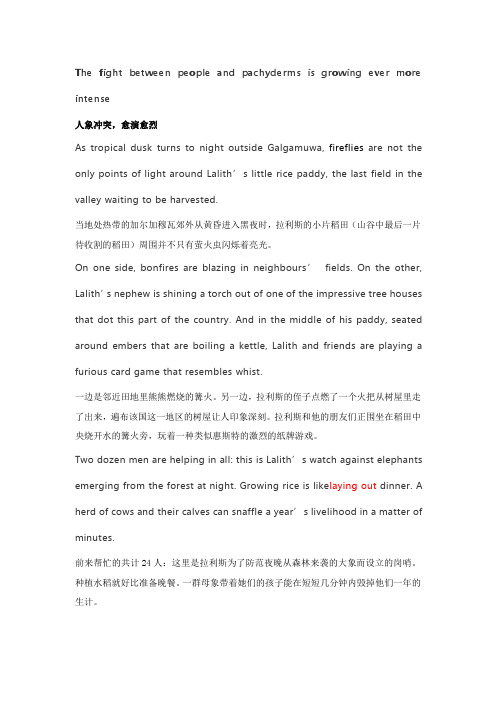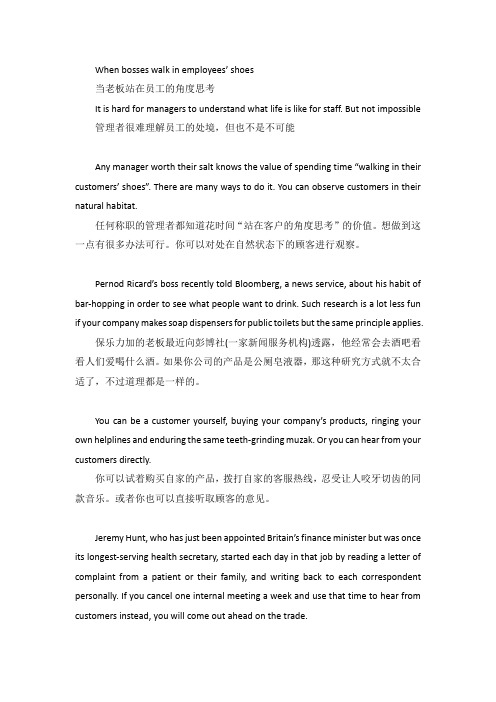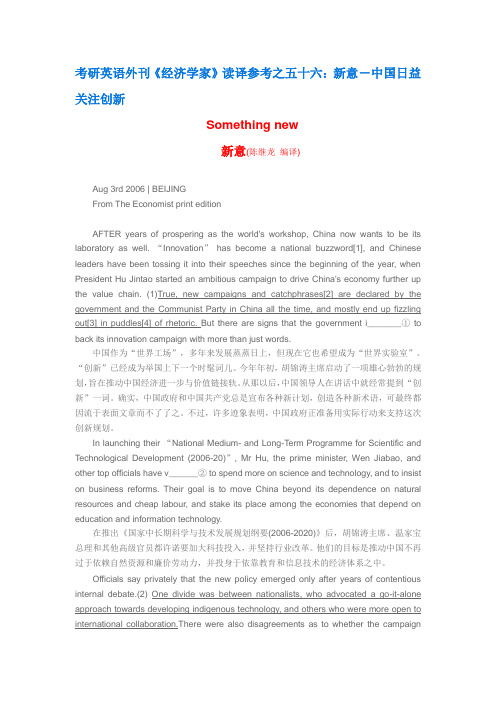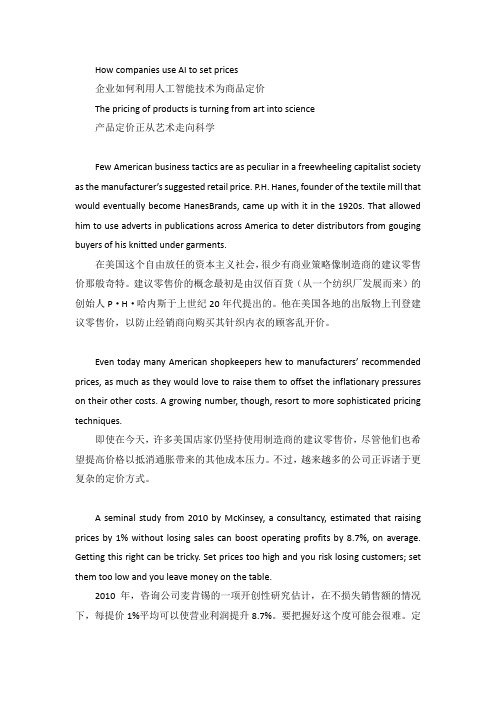经济学人_英文阅读_020
考研英语经济学人文章阅读训练2020022903

The fight between people and pachyderms is growing ever more intense人象冲突,愈演愈烈As tropical dusk turns to night outside Galgamuwa,fireflies are not the only points of light around Lalith’s little rice paddy,the last field in the valley waiting to be harvested.当地处热带的加尔加穆瓦郊外从黄昏进入黑夜时,拉利斯的小片稻田(山谷中最后一片待收割的稻田)周围并不只有萤火虫闪烁着亮光。
On one side,bonfires are blazing in neighbours’fields.On the other, Lalith’s nephew is shining a torch out of one of the impressive tree houses that dot this part of the country.And in the middle of his paddy,seated around embers that are boiling a kettle,Lalith and friends are playing a furious card game that resembles whist.一边是邻近田地里熊熊燃烧的篝火。
另一边,拉利斯的侄子点燃了一个火把从树屋里走了出来,遍布该国这一地区的树屋让人印象深刻。
拉利斯和他的朋友们正围坐在稻田中央烧开水的篝火旁,玩着一种类似惠斯特的激烈的纸牌游戏。
Two dozen men are helping in all:this is Lalith’s watch against elephants emerging from the forest at night.Growing rice is like laying out dinner.A herd of cows and their calves can snaffle a year’s livelihood in a matter of minutes.前来帮忙的共计24人:这里是拉利斯为了防范夜晚从森林来袭的大象而设立的岗哨。
考研英语阅读理解外刊原文经济学人

When bosses walk in employees’ shoes当老板站在员工的角度思考It is hard for managers to understand what life is like for staff. But not impossible 管理者很难理解员工的处境,但也不是不可能Any manager worth their salt knows the value of spending time “walking in their customers’ shoes”. There are many ways to do it. You can observe customers in their natural habitat.任何称职的管理者都知道花时间“站在客户的角度思考”的价值。
想做到这一点有很多办法可行。
你可以对处在自然状态下的顾客进行观察。
Pernod Ricard’s boss recently told Bloomberg, a news service, about his habit of bar-hopping in order to see what people want to drink. Such research is a lot less fun if your company makes soap dispensers for public toilets but the same principle applies.保乐力加的老板最近向彭博社(一家新闻服务机构)透露,他经常会去酒吧看看人们爱喝什么酒。
如果你公司的产品是公厕皂液器,那这种研究方式就不太合适了,不过道理都是一样的。
You can be a customer yourself, buying your company’s products, ringing your own helplines and enduring the same teeth-grinding muzak. Or you can hear from your customers directly.你可以试着购买自家的产品,拨打自家的客服热线,忍受让人咬牙切齿的同款音乐。
经济学人中英文

考研英语外刊《经济学家》读译参考之五十六:新意-中国日益关注创新Something new新意(陈继龙编译)Aug 3rd 2006 | BEIJINGFrom The Economist print editionAFTER years of prospering as the world's workshop, China now wants to be its laboratory as well. “Innovation”has become a national buzzword[1], and Chinese leaders have been tossing it into their speeches since the beginning of the year, when President Hu Jintao started an ambitious campaign to drive China's economy further up the value chain. (1)True, new campaigns and catchphrases[2] are declared by the government and the Communist Party in China all the time, and mostly end up fizzling out[3] in puddles[4] of rhetoric. But there are signs that the government i_______①to back its innovation campaign with more than just words.中国作为“世界工场”,多年来发展蒸蒸日上,但现在它也希望成为“世界实验室”。
“创新”已经成为举国上下一个时髦词儿。
今年年初,胡锦涛主席启动了一项雄心勃勃的规划,旨在推动中国经济进一步与价值链接轨。
考研英语阅读理解外刊原文经济学人

The Guardian view on plastics: a treaty could stem the tide《卫报》关于塑料的观点:一项条约可以遏制这个趋势There is no data on global plastic pollution that is equivalent to the regular measurements of carbon dioxide in the Earth’s atmosphere. But as with greenhouse gases, the recent news has been nearly all bad. In 1950, worldwide production of plastics stood at 2m tons per year. In 2020, it was 367m tons (down from 368m the year before due to the coronavirus pandemic). An increase this enormous is hard to visualise. But the 8.8m tons of plastic waste that is estimated to enter the world’s marine environment each year is the equivalent of a rubbish truck filled with plastic being tipped into the sea every minute.关于全球塑料污染,目前还没有与地球大气中二氧化碳的常规测量值相当的数据。
但和温室气体一样,最近的消息几乎都是坏的。
1950年,全球塑料产量达到每年200万吨。
2020年,这一数字为3.67亿吨(由于新冠肺炎疫情,它比前一年的3.68亿吨有所下降)。
考研英语阅读理解外刊原文经济学人

How companies use AI to set prices企业如何利用人工智能技术为商品定价The pricing of products is turning from art into science产品定价正从艺术走向科学Few American business tactics are as peculiar in a freewheeling capitalist society as the manufacturer’s suggested retail price. P.H. Hanes, founder of the textile mill that would eventually become HanesBrands, came up with it in the 1920s. That allowed him to use adverts in publications across America to deter distributors from gouging buyers of his knitted under garments.在美国这个自由放任的资本主义社会,很少有商业策略像制造商的建议零售价那般奇特。
建议零售价的概念最初是由汉佰百货(从一个纺织厂发展而来)的创始人P·H·哈内斯于上世纪20年代提出的。
他在美国各地的出版物上刊登建议零售价,以防止经销商向购买其针织内衣的顾客乱开价。
Even today many American shopkeepers hew to manufacturers’ recommended prices, as much as they would love to raise them to offset the inflationary pressures on their other costs. A growing number, though, resort to more sophisticated pricing techniques.即使在今天,许多美国店家仍坚持使用制造商的建议零售价,尽管他们也希望提高价格以抵消通胀带来的其他成本压力。
考研英语阅读理解外刊原文经济学人

Malaysia’s elephants stay more outside protected areas than in马来西亚大象呆在保护区外的时间比呆在保护区内的时间更久The grub is better there因为那里有更好的食物Way back in 1999, Iain Douglas-Hamilton, adoyen of research into African elephants, made an intriguing discovery. Using the Global Positioning System (GPS) to track them—a first—he found that they knew exactly where the boundaries of protected areas were.早在1999年,研究非洲象的老前辈伊恩·道格拉斯-汉密尔顿就有了一个有趣的发现。
他最早利用全球定位系统(GPS)追踪非洲象,发现它们非常清楚保护区的边界在哪里。
They ranged freely within these areas, but when crossing between them, through apparently similar but unprotected habitat, they did so at night and at what was (for an elephant) a gallop.它们会在保护区内自由活动,而一旦想穿过看似没什么区别但未受保护的栖息地时,它们会选择在夜间且疾驰而过(对于大象而言)。
At first sight, it looks as though Asian elephants did not get the memo. They seem to travel outside protected areaswith gay abandon. But a study by Ahimsa Campos-Arceiz of Xishuangbanna Tropical Botanical Garden, in Yunnan province, China, and Benoit Goossens of Danau Girang Field Centre, in Sabah, Malaysia, suggests that this abandon is not quite as gay as it seems.乍一看,亚洲象似乎不懂这些。
考研英语阅读理解外刊原文经济学人
Why do some great ideas just fail to scale?为何有些好点子无法推广?Andy Warhol put it best. “You can be watching TV and see Coca-Cola, and you know that the President drinks Coke, Liz Taylor drinks Coke, and just think, you can drink Coke, too,” he declared in 1975. “A Coke is a Coke and no amount of money can get you a better Coke than the one the bum on the corner is drinking. All the Cokes are the same and all the Cokes are good.”安迪•沃霍尔(Andy Warhol)说得最在理。
他在1975年宣称:“你在电视上看到可口可乐,你知道总统喝可乐,丽兹•泰勒(Liz Taylor)喝可乐,只要你想,你也能喝可乐。
可乐就只是可乐,花再多的钱,你喝的可乐也不会比街角流浪汉喝的可乐更好喝。
所有可乐都一样,所有可乐都好喝。
”That is true not just for Coca-Cola or, for that matter, Campbell’s soup or Brillo pads. One could say much the same about a Hollywood movie, Gmail, Ikea bookshelves, Microsoft Office, the iPhone, the Uber app, a Big Mac, a Moderna vaccine shot and YouTube.这个道理不但适用于可口可乐,还适用于金宝(Campbell's)牌汤罐头或Brillo 牌百洁布。
考研英语阅读理解外刊原文经济学人
‘Deluge of plastic waste’: US is world’s biggest plastic polluter塑料垃圾泛滥:美国成为全球最大的塑料垃圾制造国The US is the world’s biggest culprit in generating plastic waste and the country urgently needs a new strategy to curb the vast amount of plastic that ends up in the oceans, a new report submitted to the federal government has found.一份最新提交给美国联邦政府的报告发现,美国是全球最大的塑料垃圾制造国,该国迫切需要制定一项新的战略以遏制最终流入海洋的大量塑料垃圾。
The advent of cheap, versatile plastics has created “a global scale deluge of plastic waste seemingly everywhere we look”, the report states, with the US a leading contributor of disposable plastics that ends up entangling and choking marine life, harming ecosystems and bringing harmful pollution up through the food chain.报告指出,廉价而又用途广泛的塑料的出现导致塑料垃圾在全球范围内的泛滥,我们几乎随处可以看到它的存在。
美国是一次性塑料的主要制造国,这些垃圾最终导致海洋生物被缠绕甚至窒息,危害生态系统,并使有害的污染经食物链传递。
考研英语阅读理解外刊原文经济学人
My phone was controlling me, so I went on a digital diet我的“数字节食”经历I was having a much-coveted weekday lie-in when my four-year-old bounded in to inform me it was time to get dressed. Shocked to find I had wasted nearly two hours scrolling mindlessly through my phone instead of resting, I got out of bed feeling more mentally exhausted than on mornings when I get up at the crack of dawn.工作日的早上,我正躺在床上,享受自己渴望已久的赖床时光,突然我四岁的孩子蹦蹦跳跳地进来,告诉我该起床穿衣了。
我这才震惊地发现,我已经浪费了近两个小时漫无目的地刷手机,却没好好休息。
下床后,我觉得自己比平时黎明时分起床还要精神疲惫。
My husband has been complaining about my screen addiction for months. I brushed it off. But somehow those two precious lost hours jolted me into recognition: my phone was controlling me.数月来,我的丈夫一直在抱怨我对手机上瘾,我都不予理睬。
但不知何故,这宝贵的两个小时让我幡然醒悟:我的手机在控制我。
Pondering what sort of digital diet to put myself on, I came across Mind Over Tech, founded by former sculptor and web developer Jonathan Garner. About five years ago, Garner was having a personal crisis. He noticed, as I had, that part of his mental disquiet came from having limited control over his attention when he used his phone. “I was setting out to do one task but being sidetracked into something totally different.I was scrolling through Twitter before I even knew my phone was unlocked.”在思考该试试哪一种“数字节食”时,我偶然发现了Mind Over Tech,这家公司的创立者乔纳森•加纳(Jonathan Garner)曾是雕塑家和网络开发人员。
考研英语阅读理解外刊原文经济学人
A four-day week might benefit employers as well四天工作制对雇主也有好处In Britain in the 1840s, a campaign to reduce the length of the working day in factories from 12 hours to 10 prompted predictions of disaster. One parliamentarian called the idea “dangerous” while another warned such “mistaken philanthropy” would prevent workers from providing for their families.19世纪40年代的英国,一场推动工厂将工作日的劳动时长从12小时缩短至10小时的运动触发了灾难预警。
一位议员认为这个想法是“危险的”,还有议员警告称,这种“错误的好心”将令工人无法养家糊口。
But in 1846, parliament heard the results of an experiment run by an owner of large mills in Manchester and Preston. When he reduced the working day to 11 hours, he found production volumes remained the same and the quality of work improved. “It is, I believe, a fact not to be questioned that there is more bad work made [in] the last one or two hours, than the whole of the first nine or 10 hours,” he said.但在1846年,英国议会听取了一位大磨坊主的实验结果,后者在曼彻斯特(Manchester)和普雷斯顿(Preston)都拥有大型磨坊。
- 1、下载文档前请自行甄别文档内容的完整性,平台不提供额外的编辑、内容补充、找答案等附加服务。
- 2、"仅部分预览"的文档,不可在线预览部分如存在完整性等问题,可反馈申请退款(可完整预览的文档不适用该条件!)。
- 3、如文档侵犯您的权益,请联系客服反馈,我们会尽快为您处理(人工客服工作时间:9:00-18:30)。
UrbanisationSome are more equal than othersChina’s need for a new urbanisation policy reaches a critical pointJun 1st 2013 | SHENZHEN |From the print edition∙∙TweetFOR many migrants who do not live in factory dormitories, life in the big city looks like the neighbourhood of Shangsha East Village: a maze of alleys framed by illegally constructed apartment buildings in the boomtown of Shenzhen, near Hong Kong. There are at least 200 buildings, many of them ten storeys tall (see picture). They a re separated by only a metre or so, hence the name “handshake buildings”—residents of neighbouring blocks can reach out from their windows and high-five.The buildings are China’s favelas: built illegally on collectively owned rural land.Rents are cheap. An eight-square-metre (86-square-foot) flat costs less than $100a month. They symbolise both the success of the government’s urbanisationpolicy and also its chronic failures. China has managed a more orderly system ofurbanisation than many developing nations. But it has done so on the cheap. Hundreds of millions of migrants flock to build China’s cities and manufacture the country’s exports. But the cities have done little to reward or welcome them, investing instead in public services and infrastructure for their native residents only. Rural migrants living in the handshake buildings are still second-class citizens, most of whom have no access to urban health care or to the city’s high schools. Their homes could be demolished at any time.In this section∙Some are more equal than others∙Drawing the battle lines∙Staged warfareReprintsRelated topics∙Shenzhen∙Shanghai∙ChinaChina’s new leaders now say this must change. But it is unclear whether they have the resolve to force through reforms, most of which are costly or opposed by powerful interests, or both. Li Keqiang, the new prime minister, is to host a national conference this year on urbanisation. The agenda may reveal how reformist he really is.He will have no shortage of suggestions. An unusually public debate has unfolded in think-tanks, on microblogs and in state media about how China should improve the way it handles urbanisation. Some propose that migrants in cities should, as quickly as possible, be given the same rights to services as urban dwellers. Others insist that would-be migrants should first be given the right to sell their rural plot of land to give them a deposit for their new urban life. Still others say the government must allow more private and foreign competition in state-controlled sectors of the economy such as health care, which would expand urban services for all, including migrants. Most agree the central government must bear much more of the cost of public services and give more power to local governments to levy taxes.Any combination of these options would be likely to raise the income of migrants, help them to integrate into city life and narrow the gap between the wealthy and the poor, which in China is among the widest in the world. Such reforms would also spur on a slowing economy by boosting domestic consumption.Officials know, too, that the longer reforms are delayed the greater the chances ofsocial unrest. “It is already a little too late,” Chen Xiwen, a senior rural policy official, said last year of providing urban services to migrants. “If we don’t deal with it now, the conflict will grow so great that we won’t be able to proceed.”Yet Mr Li, the prime minister, would do well to dampen expectations. The problems of migrants and of income inequality are deeply entrenched in two pillars of discriminatory social policy that have stood since the 1950s and must be dealt with before real change can come: the household registration system, or hukou, and the collective ownership of rural land.Who will pay?The hukou perpetuates a rigid caste system. Children of holders of rural hukou inherit their parents’ second-class status, even if they are born in cities. Many urbanites want to keep this system in place, to protect their preferential access to jobs, education and health care.City governments, meanwhile, cannot afford to extend public services to migrants. Zheng Zhijie, president of state-owned China Development Bank, estimated in May that cities would require 50 trillion yuan ($8.2 trillion) in investment by 2020 to accommodate 100m new migrants and provide increased benefits to those already there. Shanghai’s schools give a sense of the scale of the problem: the city had 170,000 students enrolled in high school in 2010, all holders of Shanghai hukou; more than three times that many children—570,000 migrant children aged 15 to 19—were living in the city in 2010 without Shanghai hukou, most of them unable to attend those schools.The collective control of rural land by local officials also impedes social mobility, by allowing local governments and developers to dispossess farmers of the land they lease—and to pay them far below market value for it. Yu Jianrong, a researcher on rural China, calculated in 2010 that the government had expropriated 6.7m hectares (16.5m acres) of rural land over a 20-year period, paying farmers 2 trillion yuan ($326 billion) less than market value.At the same time, housing prices in cities are increasingly out of reach for migrants. The central government has encouraged the construction of low-cost housing in cities with limited success, since only local hukou holders are eligible.The discriminatory policies continue to take their toll on migrants. China has 163m migrant workers who have left their home township (another 99m people are classified as migrants even though they have only given up farming withoutmoving away). A higher proportion of those were co-renting apartments with others in 2012 than four years earlier (19.7%, up from 16.7%), according to data released this week by the National Bureau of Statistics. And fewer migrants are becoming homeowners—0.6% in 2012, down from 0.9% in 2008.Some scholars say a solution lies in the handshake buildings of Shenzhen. Tao Ran of Renmin University in Beijing says the government should legalise such buildings around the country—allowing rural dwellers near cities to develop them and rent out flats to migrants—and then levy taxes and fees to pay for expanding services. It sounds like a reasonable proposal that would increase the supply of affordable housing and help more migrants become proper urban residents.But local governments will have none of it, Mr Tao says, as they will fight to retain control over land, their chief source of revenue. Other vested interests, he says, will fight, too. The road to equality for China’s migrants will continue to be a hard one.。
